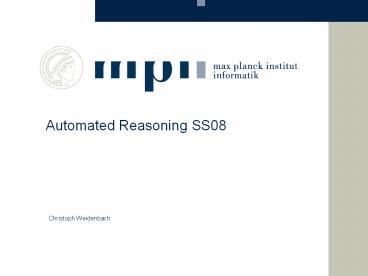PowerPoint-Pr PowerPoint PPT Presentation
Title: PowerPoint-Pr
1
Automated Reasoning SS08
Christoph Weidenbach
TexPoint fonts used in EMF. Read the TexPoint
manual before you delete this box. AAA
2
Content
Logic
Calculus
Algorithms
First-Order Logic Theories
SUP(T)
Coupling
First-Order Logic
Superposition
Indexing, Sharing, Filtering
Propositional Logic Theories
DPLL(T)
Coupling
Linear Arithmetic
Propositional Logic
DPLL
2-Watch, Learning
3
Propositional Logic
4
Hardware
- Industrial Processor Verification 14-cycle
Model Checking - 1Mio Variables, 10 Mio Literals, 4 Mio Clauses
- 3 hours run time (2004)
5
SUDOKU
1 2 3 4 5 6 7 8 9
1 2 3 4 5 6 7 8 9
6
Summary
- propositional logic is suitable to represent
finite domains - software restrict all variables to finite
domain - hardware restrict number of cycles
- suitable to test problems with thousands of
variables - Limits infinite domains or calculations,
i.e., mathematical structure
7
Propositional Logic T
8
Dutch Soccer League
- if Eindhoven and Amsterdam play on the same day
the TV income is x - If Eindhoven and Amsterdam play on two different
days, the income is 2x - if a team plays on Wednesday champions league it
doesnt play on Friday - there are at most 3 plays on Friday
- .. in sum several thousand constraints over LP
and Boolean variables - League is modelled by the Barcelogic tool
9
Transition Systems
10
Summary
- propositional logic T can also represent
aspects of infinite theories - for the meta algorithm for the theory often
nice properties are needed - bottleneck often the solver for T
- Limits quantification and free structures
beyond boolean combinations
11
First-Order Logic
All professors love squeezing all students. Chris
is a professor.
12
SUDOKU
9 5
7
2, 3, 4
1, 4, 6, 8
13
SUDOKU
14
SUDOKU
1 2 3 4 5 6 7 8 9
1 2 3 4 5 6 7 8 9
7
15
SUDOKU
1 2 3 4 5 6 7 8 9
1 2 3 4 5 6 7 8 9
7
16
LAN Router
Sent(epacket(incoming-net, router-mac, src-mac,
e-ip, ippacket(ip-src, ip-dst, ip-proto,
ip-data))))RouteEntry(route(router,dst-netmask,ds
t-net-addr,outgoing-net)) ipand(ip-dst,dst-netmask
) dst-net-addr Sent(epacket(outgoing-net,
dst-mac, src-mac, e-ip, ippacket(ip-src, ip-dst,
ip-proto, ip-data)))
17
Summary
- first-order logic can model freely defined
infinite theories - inductive theories are out of scope
- incredible expressiveness
- full quantification
- Limits undecidable (take serious), some
important theories can not be (finitely)
represented
18
First-Order Logic T
All professors above 50 love squeezing all
students. Chris is a professor below 50.
19
Hybrid Automata
20
Summary
- first-order logic T can also model aspects
involving inductive theories - adequately represent many aspects of software,
hardware - incredible incredible expressiveness
- quantification over theory variables potentially
limited - Limits very undecidable (take serious), in
general not compact, and any calculus not
complete
21
The End Lets Start
Logic
Calculus
Algorithms
First-Order Logic Theories
SUP(T)
Coupling
First-Order Logic
Superposition
Indexing, Sharing, Filtering
Propositional Logic Theories
DPLL(T)
Coupling
Linear Arithmetic
Propositional Logic
DPLL
2-Watch, Learning

